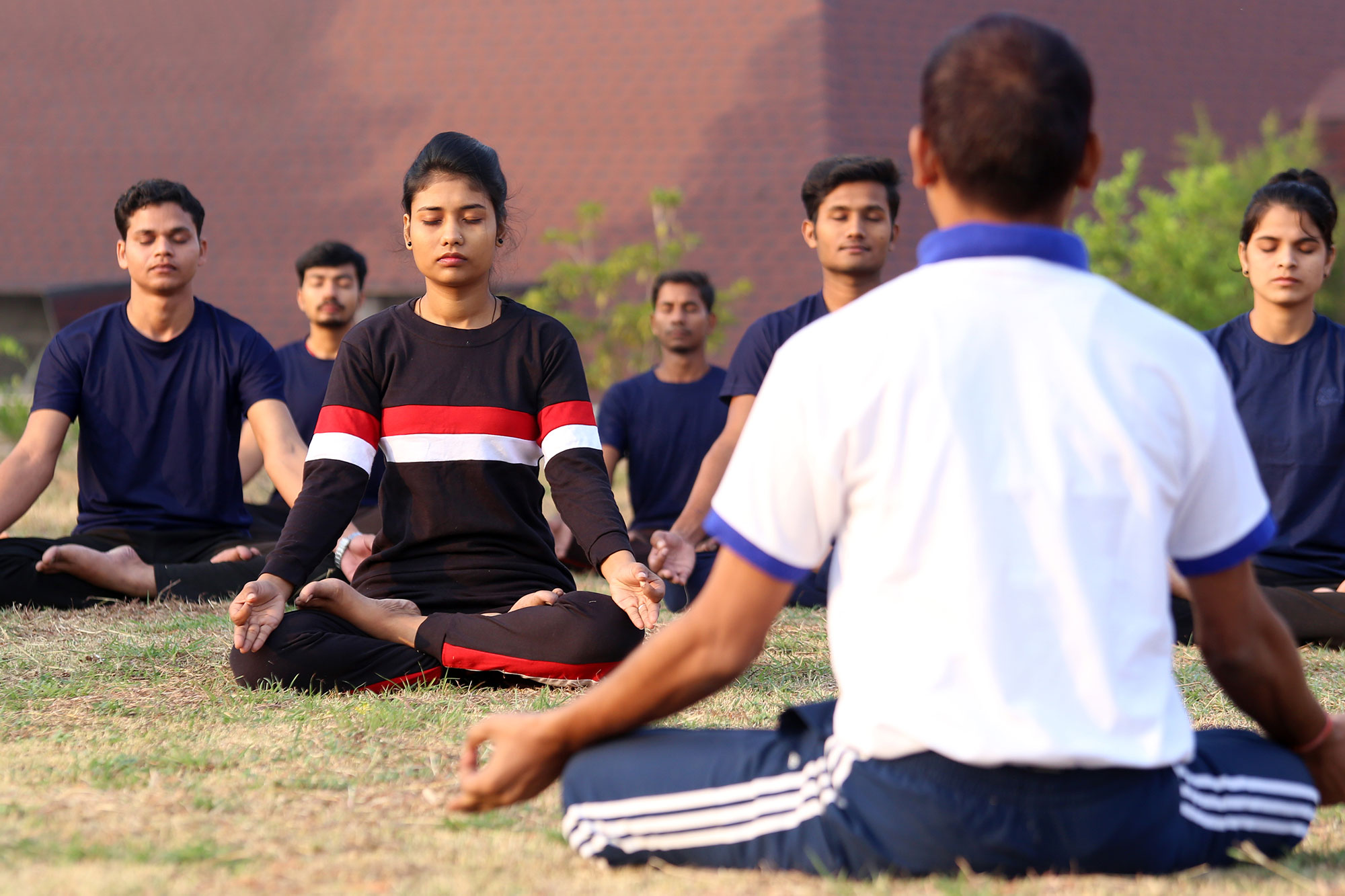
You may be unsure about your postures when you first start practicing yoga. You might worry about how to perform a pose. Doubting your ability to do the pose correctly can cause you discomfort. Rather than concentrating on your postures, focus on building a strong body-mind connection. These tips can help you get the best poses possible and avoid discomfort during your practice.
You can maximize the benefits from your yoga class by arriving early. Trying to rush into a class can bring anxiety. New students frequently admit feeling nervous before their first yoga class. Being late can increase anxiety and discomfort. It is best to arrive on time. You can settle in, get a bathroom and adapt to the room's energy. Talk to a teacher if it is unclear how long it will take.

Preparation for your first class of yoga. You should arrive early in order to secure a spot and to familiarize yourself with beginner-friendly poses. Avoid eating large meals prior to class. This will make the stomach uncomfortable from the constant movement. Avoid eating large meals before your class. Moving around too much can cause discomfort. Talk to your doctor if you have concerns about stomach discomfort.
Respect your teacher. Yoga instructors will correct your postures. While hands-on instruction is very helpful, you should keep in mind that it's a personal practice, and every student's goals and abilities will vary. It is important to remember to have a lot of fun, even if you are stuck in difficult poses. Do not feel guilty if your yoga teacher corrects your posture. You should embrace the corrections and enjoy the process.
Yoga classes can be overwhelming for beginners. Learn what common poses are before you attend a class. It can be confusing to practice the poses until you are familiar with their names. You can instead look at photos and see the names of the poses. Once you have an idea of the hardest ones, you can then choose which ones to do. Once you find your personal yoga sweet spot, it's time to move on to the next level.

It's important to realize that yoga can be challenging, especially for beginners. You don't have to learn it all at once. You may need to take your time learning yoga. The most important thing is to be patient as you learn a new skill. Once you do that, it will be easier to concentrate on the task at hand. Yoga instructors can help you learn the skills required to run a successful yoga practice.
FAQ
What is Positive Psychology & Why is It Important?
Positive psychology examines the aspects of positive psychology that can make us feel better about ourselves. These include happiness, optimism. gratitude, hope. kindness. compassion. forgiveness. courage. curiosity. empathy. spirituality. The goal of positive psychology is to help individuals become happier, healthier, and wiser through self-improvement.
There are two types, trait positive psychology and positive process psychology. Trait positive psychology studies the natural behavior of people. Positive psychology research explains how certain strategies can be used to reach specific goals.
How does mental well-being affect daily life?
Mental illness affects everyone at some point in his life. The difference between individuals with mental illness or others is the fact they don’t seek treatment. Talk to someone if something feels wrong. There are many treatments for depression, anxiety and stress.
Which 5 ways can we improve our wellbeing?
Wellbeing refers to "the state or condition of being physically, mentally, spiritually, and socially well." Our well-being is affected by many factors, including family, work and health. The first step in improving your well-being involves identifying the areas of your life that need improvement. Then, work on changing these things.
Here are five methods to improve your health and well-being.
-
Exercise – Physical activity increases endorphins that make us feel happier.
-
Sleep - Sleeping for more than six hours a night reduces anxiety and stress.
-
Nutrition - Eating healthy foods (such as fruits and vegetables) will boost your mood.
-
Meditation - Regular meditation can reduce stress and anxiety.
-
Socialization – Spending time with family and friends makes us feel happy.
Are mental health and work more important than mental health?
Working is stressful and mental health is crucial. You can relax if you are feeling stressed at work by going out with your friends, walking outside or listening to music.
Talk to your boss or supervisor if you feel stressed. They might be able suggest ways to reduce stress.
It is also important to take care of your health. Eat right, exercise, get enough sleep, and eat healthy.
Why is it important to improve your emotional health?
Emotional health is essential for happiness and well-being. You won't be able perform at your best if you aren't emotionally healthy. Depression can make it difficult for people to perform at their best. Anxiety, panic attacks or insomnia may be common symptoms. The good news is that these conditions can be treated successfully with medication and therapy.
What does my mental health have to do with my relationships?
Your mental health can have a profound impact on your daily life. It affects your ability function properly at school, work, and home. It can be difficult to build meaningful relationships due to mental health issues.
It's easy for people to judge you when you have a mental illness. You might even avoid social situations if you feel like no-one understands.
You must remember that people want you to be around them. They just need to know how to approach you.
Talking to others about your feelings can help you connect with them. Talk to them about your feelings and get their opinion.
What should I do when I'm experiencing mental health problems?
When you have any kind of mental health problem, it's important to seek treatment. It is possible that you have been subject to abuse or trauma in the past. It is possible that your thoughts about yourself have been affected by this.
You may also be suffering from an eating disorder, addiction, or another type of mental illness. These disorders can cause serious damage to your life.
They shouldn't be dealt with on their own. Instead, talk to someone who can help you. These challenges can be overcome with the help of a professional therapist.
Statistics
- More than 50% will be diagnosed with a mental illness or disorder at some point in their lifetime.3 (cdc.gov)
- Similarly, while there is some agreement about the boundaries of typical mental disorders 2, there is likely less agreement about those for positive mental health. (ncbi.nlm.nih.gov)
- According to the National Alliance of Mental Illness (NAMI), one in five Americans experiences mental health issues which translates to more than 40 million adults a year. (doctorondemand.com)
- It means no drinking any alcoholic beverages and no taking any drugs that aren't 100% natural.
- More than 40 million adults in the United States have an anxiety disorder, but less than 37% of people seek mental health treatment for their symptoms. (talkspace.com)
External Links
How To
How to Care for Children with Autism
Autism spectrum disorder (ASD), which is a neurodevelopmental disease, causes repetitive behaviors and social impairments. ASD affects one in 50 people around the world. However, there is no cure.
The 18-month-old age of infancy is when the symptoms first appear. Common signs include difficulty understanding others emotions, difficulties with language development, inability to make eye contact, difficulty understanding other people's emotions and difficulty learning new skills. These symptoms can sometimes lead directly to severe behavioral problems such as aggression, anxiety and depression.
Researchers believe that genetics are a factor in this disorder. However, there is no current cause. ASD could be triggered by environmental factors such as infections, stress, medication, vaccines, alcohol and tobacco use. Evidence suggests that certain viruses like rubella or measles could increase your risk of developing ASD later.
Early intervention and diagnosis can improve outcomes. However, many parents struggle with their child’s behavior once they are in school. Different treatment options are available depending on the severity and type of the problem. Research shows that therapy focused on improving social interaction and decreasing problem behavior can make a significant difference.